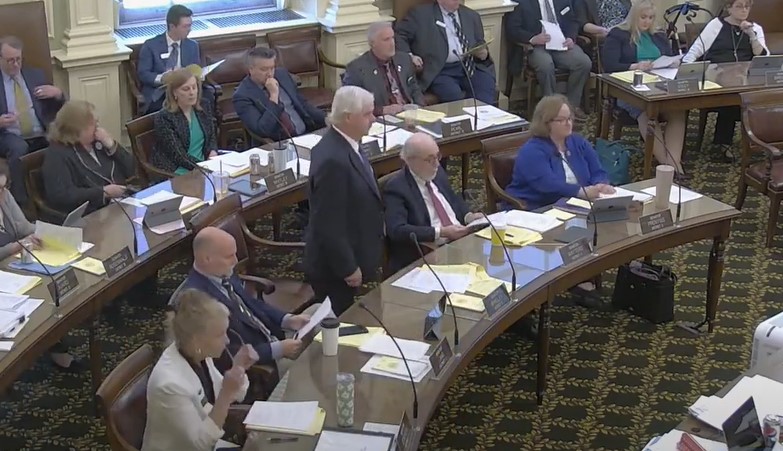By PAULA TRACY, InDepthNH.org
CONCORD – After Gov. Chris Sununu laid a path forward for legal adult cannabis sales in the state last week, the Senate voted Thursday to create a commission to work on his plan. It now goes to the House for consideration.
Senate President Jeb Bradley, R-Wolfeboro, offered the amendment creating the commission to House Bill 611-FN which expands the definition of those who can enroll in the state’s therapeutic cannabis program. The bill as amended passed on a voice vote.
Bradley has been an opponent of legalized marijuana sales for years. Still, he said given Sununu’s statement on working on the issue, the commission he envisions would “do it right.”
While the House overwhelmingly passed HB 639 which would have legalized cannabis, it was killed 14-10 last week in the Senate.
The next day Sununu said he thinks now is the time and this is the legislature to allow for controlled adult cannabis sales.
The floor Amendment to HB 611-FN is “an act relative to eligibility criteria for the therapeutic cannabis program and establishing a commission to study state-controlled sales of cannabis.”
The goals of the commission would be to study the feasibility of establishing a state-controlled system to sell marijuana to adults 21 years and older that also allows the state to control distribution and access; keeps marijuana away from kids and out of schools; controls the marketing and messaging of the sale of marijuana; prohibits “marijuana miles” or the over-saturation of marijuana retail establishments; empowers municipalities to choose to limit or prohibit marijuana retail establishments; reduces instances of multi-drug use; and does not impose an additional tax so as to remain competitive.
The first meeting of the new commission would be held within 45 days of passage and a final report would be due by December 1, 2023.
It is attached to a bill that removes the requirement that severe pain be resistant to other treatment options in order to be considered a qualifying medical condition for therapeutic cannabis.
Sen. Sharon Carson, R-Londonderry, who chairs the Senate Judiciary Committee, urged passage of the bill saying the patient should not have to go through surgery or use opioids before being able to access therapeutic cannabis.
It was then that Bradley stepped away from the podium and offered his amendment on the Senate floor.
“One of the beautiful things about being able to serve in this room is that there are 24 of us. We get to know each other pretty well,” Bradley said. “We learn how to count” votes.
Bradley said he thinks over the years that the Senate has worked to do things right.
“Even when we disagree with a policy we do try to work together,” Bradley said. “That is why I am here introducing this floor amendment.”
He noted the body had “spirited debate” last week when it deliberated on House Bill 639 which would have allowed for the retail sale of cannabis to adults.
And while the Senate voted it down, he said the House is considering including that bill in other bills including permanent Medicaid expansion, something the Senate overwhelmingly wants to see.
He said that even though as Senate President and having spoken to a lot of people on both sides of the issue “there is a presumption, a commitment, an understanding of our roles,” and “that we are going to do it right, not rushed.”
Using another sports analogy he went to football and said sometimes you have to punt.
“While I’m not happy with the direction we are on, I do have a commitment and we all have one to see it done right,” Bradley said.
He said he tried to structure the commission to ensure it is done fairly and that all sides of the debate are heard.
“I think it is very important that we get it right and that we are able to finish this session without too much…back and forth…hostage taking…and bring everyone to the table to the discussion,” Bradley said.
The commission would study state-controlled cannabis and would include five members of the Senate, appointed by the Senate President; five members of the House, appointed by the Speaker; the Attorney General, or designee; the governor, or designee; a representative of the New Hampshire Association of Chiefs of Police, chosen by that organization; a representative of the New Hampshire Bankers Association, selected by that organization; the chairman of the New Hampshire Liquor Commission, or designee; a representative of the New Hampshire Cannabis Association, selected by that organization; a representative of the American Civil Liberties Union-New Hampshire, selected by that organization; a representative of Alternative Treatment Centers, which sell therapeutic cannabis, appointed by the speaker of the house; a medical professional, appointed by the senate president; and a representative of Communities for Alcohol and Drug-free Youth, chosen by that organization.





